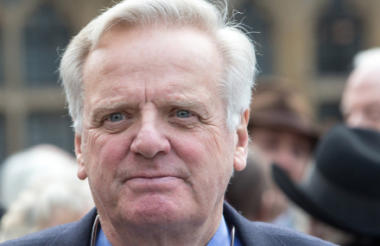The chair of the Fundraising Regulator will ask all the charities fined by the Information Commissioner's Office to explain what happened and what "remedial steps they have taken".
A spokesman for the Fundraising Regulator said that Lord Grade, chair of the Fundraising Regulator board, would be writing to each of the 11 charities fined by the ICO yesterday to request “they provide an account for the Fundraising Regulator of the remedial steps they have taken” to prevent future data protection breaches.
The spokesman said: “Lord Grade, chair of the Fundraising Regulator’s Board, will write formally to each of the charities involved to request that they provide an account for the Fundraising Regulator of the remedial steps they have taken or intend to take to address the breaches identified by the Information Commissioner.”
“The remedial action plans should include: Ceasing fundraising activities where the necessary consents are not in place; and reviewing fundraising activities and systems to ensure that they are fit for purpose and legally compliant.”
The spokesman also said that “The Fundraising Regulator is clear that charities must always meet their legal obligations in ensuring they have the required consents in place for the use of personal data. Charities have a responsibility to treat donors with respect and to maintain a mutually beneficial and trustful relationship with their donor base.”
Dunmore 'disappointed' by some charities' reactions
Speaking on Radio Five Live last night, Stephen Dunmore, chief executive of the Fundraising Regulator, said he'd been "dissapointed" in the way some of the 11 charities had reacted to the ICO's findings against them.
"We work very closely with the ICO and the Charity Commission, and I must say that I am disappointed in the way that some charities have responded," he said, particularly referring to comments from Gemma Holding, chief executive of Cancer Support UK (formerly Cancer Recovery Foundation UK), who called the fines "ill founded, excessive and disproportionate”.
Dunmore also called on HM Treasury to find a way of "recycling" the £138,000 taken in from the ICO fines "back into the charitable sector", a move he said would be "a good thing".
"I have a view that, since the fines that are paid to the ICO go straight into the Treasury there might be a way of the Treasury recycling those funds back into the charitable sector. If they could, then that would be a good thing."
IoF: there are some unanswered questions
The Institute of Fundraising has said “there are still some questions” the ICO needs to answer following its issuing 11 charities with fines for data protection breaches.
In its response to the monetary penalties issued by the Information Commissioner’s Office, the IoF said there “are still some questions on exactly how charities can make sure that they comply with the rules” that it wished to put to the ICO.
It also said that it is “working with the ICO to address these so that charities can continue to raise vital funds safely and lawfully to help the most vulnerable in society”.
The IoF response in full from Peter Lewis, the fundraising membership body’s chief executive, reads: “Good charity fundraising is grounded in making connections between people and the causes that they care about. Understanding donors to find out more about what they’re interested in, identifying new supporters, and personalising how charities approach people ensures a better experience of charity fundraising for everyone.
“It’s equally important in helping to ensure that charities aren’t inadvertently approaching people who prefer not to hear from them. Rather than causing upset, we believe this is the approach to fundraising that many donors would like and expect charities to take.
“As today’s ICO rulings highlight, it is important that people are informed about how charities use their personal data for fundraising purposes. No charity knowingly wants to breach the rules, and charities work hard to meet the highest standards. The charities involved have responded by taking important steps to improve their practices.
“Charities respect their supporters’ rights and privacy and want to ensure that they get this right. There are still some questions on exactly how charities can make sure that they comply with the rules and we are working with the ICO to address these so that charities can continue to raise vital funds safely and lawfully to help the most vulnerable in society.”
However, a spokeswoman from the IoF said it was “not currently planning on producing any guidance” on the issue.
NCVO ‘glad the ICO has drawn a line’ under fundraising investigations
In its response, the National Council for Voluntary Organisations welcomed the fact that the ICO have “drawn a line under” enforcement action on charities and considers the matter closed.
Elizabeth Chamberlain, head of policy at NCVO, said: “We’re glad the ICO has drawn a line under its enforcement action with charities and considers these matters closed. Charities have made substantial effort in the two years to overhaul their methods to ensure that they are fully compliant with the law. Many are going further and looking to see how they can give supporters total control over how they are communicated with.
“Charities know the public’s trust in them is vital, and that they need to operate to the highest standards. Charities have supported the establishment of a new Fundraising Regulator which is strengthening the fundraising code of practice and ensuring members of the public are protected from unwanted fundraising request.”
|











